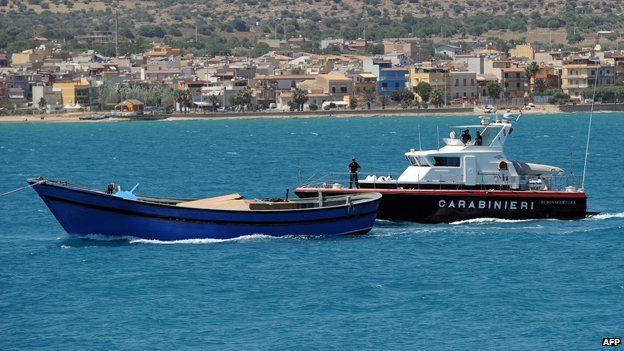The gruesome truth behind an idyllic scene
- Published

More than 66,000 migrants and refugees have arrived on Italy's shores this year. But many don't survive the journey - and when the Italian navy went to help migrants crammed on to a boat near Sicily, they were shocked by what they found.
The first images were tranquil enough. A fishing boat sat on a bay in Sicily in the summer sunshine.
As gusts of wind ruffled the water around her, she swung a little on her mooring.
There was nothing in that television picture to suggest that there was anything wrong.
But down in her blue hull, the boat carried a dreadful cargo. A hold packed with bodies. A great tangle of corpses.
As the camera pulled back you saw figures gathering on the quay, police and forensic experts, all dressed in white overalls, and with masks over their faces.
When the fishing boat came alongside, they would go to work.
The first time we'd seen that blue hull it appeared in footage shot far out at sea by the Italian navy.
The boat was loaded with migrants making the journey from North Africa, desperate to reach Italy and all the promise of Europe.
Around 600 passengers covered every inch of the deck. And they sat all around the sides of the boat, crammed tight, shoulders pressed against shoulders.
As the vessel rose and fell in the swell, a navy boarding party went in to investigate. And the sailors discovered that just beneath the feet of that mass of passengers, there were many dead.
Dozens had suffocated in a hold below deck.
There were so many bodies in such a small space that out at sea they couldn't even be counted, never mind unloaded. They were left aboard, and the boat was towed into the Sicilian port of Pozzallo.
Eventually 45 corpses were brought out onto the quayside.
These men who'd set out from places south of the Sahara had at last arrived in Europe, the destination of their dreams - but the journey had cost them everything.
A 20-year-old passenger from Gambia, Ebrima Singhetedi, gave his account of what happened.
He told La Repubblica newspaper that when the boat set out from Libya the hatch leading to the hold had been open. Those below would have been able to breathe.
But then the weather became rougher, and the boat began to roll. The people in the hold got scared and they started trying to climb up onto the already hopelessly overcrowded, heaving deck.
But according to Ebrima, some of those up top were determined to prevent that. They closed the hatch, and kept it shut.
A Syrian passenger backed up that story. He seemed to suggest some on deck feared those attempting to get out of the hold would make the boat even more dangerously unstable.
Ebrima said the passengers trapped below screamed for hours. But eventually their cries died away.
Not long afterwards the Italian navy came into view.
Among the dead were some of Ebrima's friends from his village back in Gambia, and a cousin.
We know that even on these migrant vessels there can sometimes be a crude division among the passengers along economic lines.
Those who pay the people smugglers a little more might be able to travel up on deck in the fresh air, where they're safer if there's a sudden sinking. The poorer travellers can end up below decks, enduring the heat and breathing the engine fumes.
The Syrian passengers fleeing their country's civil war often tend to be more middle class, and able to afford a slightly more comfortable journey.
The poorer people - like those from villages in Gambia - can find themselves making a harder, more dangerous passage.
And it's in the interests of the smugglers to pack their unseaworthy boats as full as they can.
Each passenger pays at least $1,500 (£874) for the trip. So those who herded the 600 people aboard Ebrima's boat might easily have earned $1m (£583,000).
With so much money to be made, and so many people trying to escape war and poverty in the Middle East and Africa, the flow of migrants seems to grow all the time.
Around 45,000 landed in Italy last year, but more than 60,000 have come this year, and we're still only in July.
The navy is running a round-the-clock search and rescue operation in the waters south of Sicily, picking up hundreds of people almost every day.
The facilities available to receive this influx are being stretched beyond their limits.
And Italy feels that it's being left to cope with all this very much alone.
Its politicians are making increasingly strident demands for more help from the EU in the effort to address this growing humanitarian crisis at the gates of Europe.
How to listen to From Our Own Correspondent:
BBC Radio 4: Saturdays at 11:30 and some Thursdays at 11:00
BBC World Service: Short editions Monday-Friday - see World Service programme schedule.
Subscribe to the BBC News Magazine's email newsletter to get articles sent to your inbox.
- Published30 June 2014
- Published2 July 2014
- Published13 October 2013